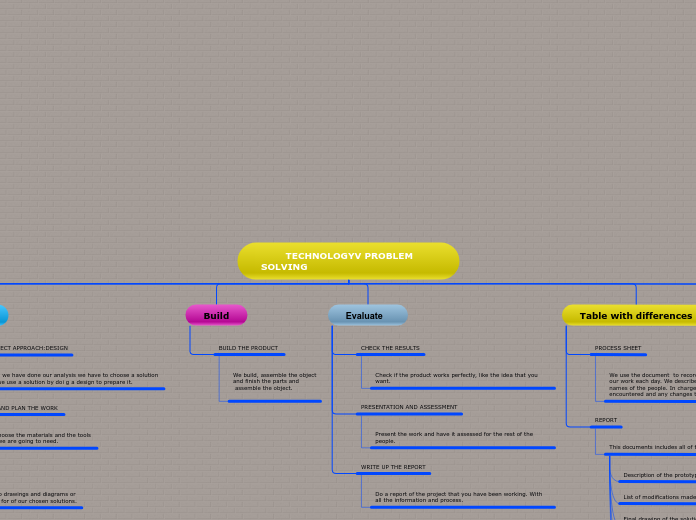TECHNOLOGYV PROBLEM SOLVING
Definition
Working method to adress issues and find a solution to a problems. It is based on a series of basic operations. The four stages are: analyse, design, build and evaluate.
Analyse
DETECT THE PROBLEM OR NEED
INFORMATION AND RESEARCH
We study and select information
on different ways
we could resolve the problem.
SEARCH FOR POSSIBLE SOLUTION
We think of the different options.
CHOOSE THE SOLUTION
We choose the best solution for
resolve the problem.
Types of analysis
MORPHOLOGICAL ANALYSIS
We analyse the shape of the object, its size, colour and basic physical characteristics
FUNCTIONAL ANALYSIS
How the object works, howe it is used and the potential risks of its use.
TECHNICAL ANALYSIS
We evaluate how the object was made.
ECONIMIC ANALYSIS
We analyse the financial cost of manufacturing the product and its selling price.
SOCIAL ANALYSIS
We study the object from the point of view of its social impact and analyse the human needs that it meets.
AESTHETIC ANALYSIS
We evaluate how our senses react to a object, its appearance, whether it looks nice or not, whether we find attractive, etc,
HISTORICAL ANALYSIS
Evaluate the possible reasons why the object emerged and its development.
Design
THE PROYECT APPROACH:DESIGN
When we have done our analysis we have to choose a solution and we use a solution by doi g a design to prepare it.
PREPARE AND PLAN THE WORK
We choose the materials and the tools
that we are going to need.
DESING
We do drawings and diagrams or
plans for of our chosen solutions.
TECHNICAL DESING DOCUMENTS
DRAWINGS:
Show how the object looks like.
LIST OF MATERIALS AND TOOLS:
When we have designed our solution, its very important to list all the materials that we will need to buil it.
BUDGET
Build
BUILD THE PRODUCT
We build, assemble the object
and finish the parts and
assemble the object.
Evaluate
CHECK THE RESULTS
Check if the product works perfectly, like the idea that you want.
PRESENTATION AND ASSESSMENT
Present the work and have it assessed for the rest of the people.
WRITE UP THE REPORT
Do a report of the project that you have been working. With all the information and process.
Table with differences
PROCESS SHEET
We use the document to record the progress of the stages of our work each day. We describe the completed tasks and the names of the people. In charge of them the difficulties we encountered and any changes that we had to make.
REPORT
This documents includes all of this:
Description of the prototype built.
List of modifications made.
Final drawing of the solution.
Total cost of the proyect.
Environmental impact of the solution created.
Your own thoughts about how the work went.
Sale cycle
Price
Is a crucial element in the scale of a product.
Promotion
The most common tyoes of promotion are adversiting compains on the television, the newspaper and on digital media.
Distribution
When the company distribuates a product,it decides which cannel it will use.
Wholescale: the product is supplied to retailers and large consumers.
Retail sale: the product is supplied directly to end-user.
Online sell: the product is distributed through websided,apps…
Franchises: the product is sold through a network of stores owned by private individuals who adopt the product as their own.
Innovation and obsolescence
INNOVATION
Modification madre to a product to adapt it to new cordinations brought about by changes in requirements or progress.
OBSOLESCENSE
Products that have fallen into disuse because they don´t have the functionality of the new technologies appearing on the market.
POSITIVE INFLUENCE OF TECHNOLOGICAL DEVELOPMENT IN SOCIETY
We are able to settle in one place, we can be independent of weather conditions, communication with each other and the life expectancy has increased considerably.
NEGATIVE INFLUENCE OF TECHNOLOGICAL DEVELOPMENT IN SOCIETY
Fossil fuel cause the deterioration of our enviroment, this can cause healthy problems.
